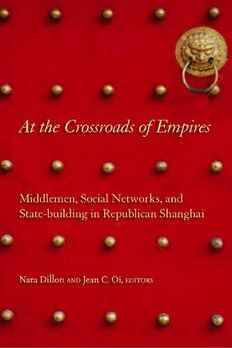
At the Crossroads of Empires: Middlemen, Social Networks, and State-Building in Republican Shanghai PDF
Preview At the Crossroads of Empires: Middlemen, Social Networks, and State-Building in Republican Shanghai
at the crossroads of empires This content downloaded from (cid:0)(cid:0)(cid:0)(cid:0)(cid:0)(cid:0)(cid:0)(cid:0)(cid:0)(cid:0)(cid:0)(cid:0)137.189.171.235 on Tue, 11 Aug 2020 02:58:22 UTC(cid:0)(cid:0)(cid:0)(cid:0)(cid:0)(cid:0)(cid:0)(cid:0)(cid:0)(cid:0)(cid:0)(cid:0) All use subject to https://about.jstor.org/terms This content downloaded from (cid:0)(cid:0)(cid:0)(cid:0)(cid:0)(cid:0)(cid:0)(cid:0)(cid:0)(cid:0)(cid:0)(cid:0)137.189.171.235 on Tue, 11 Aug 2020 02:58:22 UTC(cid:0)(cid:0)(cid:0)(cid:0)(cid:0)(cid:0)(cid:0)(cid:0)(cid:0)(cid:0)(cid:0)(cid:0) All use subject to https://about.jstor.org/terms At the Crossroads of Empires Middlemen, Social Networks, and State-Building in Republican Shanghai Edited by NARA DILLON and JEAN C. OI stanford university press stanford, california 2008 This content downloaded from (cid:0)(cid:0)(cid:0)(cid:0)(cid:0)(cid:0)(cid:0)(cid:0)(cid:0)(cid:0)(cid:0)(cid:0)137.189.171.235 on Tue, 11 Aug 2020 02:58:22 UTC(cid:0)(cid:0)(cid:0)(cid:0)(cid:0)(cid:0)(cid:0)(cid:0)(cid:0)(cid:0)(cid:0)(cid:0) All use subject to https://about.jstor.org/terms Stanford University Press Stanford, California www.sup.org © 2008 by the Board of Trustees of the Leland Stanford Junior University. All rights reserved. No part of this book may be reproduced or transmitted in any form or by any means, electronic or mechanical, including photocopying and recording, or in any information storage or retrieval system without the prior written permission of Stanford University Press. Printed in the United States of America on acid-free, archival-quality paper Library of Congress Cataloging-in-Publication Data At the crossroads of empires : middlemen, social networks, and state-building in republican Shanghai / edited by Nara Dillon and Jean C. Oi. p. cm. Includes bibliographical references and index. isbn 978-0-8047-5619-8 (cloth : alk. paper) 1. Social networks—China—Shanghai—History—20th century. 2. Pluralism (Social sciences)—China—Shanghai—History—20th century. 3. Shanghai (China)—History—20th century. 4. Shanghai (China)—Politics and government—20th century. I. Dillon, Nara. II. Oi, Jean Chun. hn740.s484a8 2008 302.40951’13209041—dc22 2007008887 Typeset by Newgen in 10/12.5 Palatino This content downloaded from (cid:0)(cid:0)(cid:0)(cid:0)(cid:0)(cid:0)(cid:0)(cid:0)(cid:0)(cid:0)(cid:0)(cid:0)137.189.171.235 on Tue, 11 Aug 2020 02:58:22 UTC(cid:0)(cid:0)(cid:0)(cid:0)(cid:0)(cid:0)(cid:0)(cid:0)(cid:0)(cid:0)(cid:0)(cid:0) All use subject to https://about.jstor.org/terms To the memory of Frederic Wakeman, Jr., 1937–2006 This content downloaded from (cid:0)(cid:0)(cid:0)(cid:0)(cid:0)(cid:0)(cid:0)(cid:0)(cid:0)(cid:0)(cid:0)(cid:0)137.189.171.235 on Tue, 11 Aug 2020 02:58:22 UTC(cid:0)(cid:0)(cid:0)(cid:0)(cid:0)(cid:0)(cid:0)(cid:0)(cid:0)(cid:0)(cid:0)(cid:0) All use subject to https://about.jstor.org/terms This content downloaded from (cid:0)(cid:0)(cid:0)(cid:0)(cid:0)(cid:0)(cid:0)(cid:0)(cid:0)(cid:0)(cid:0)(cid:0)137.189.171.235 on Tue, 11 Aug 2020 02:58:22 UTC(cid:0)(cid:0)(cid:0)(cid:0)(cid:0)(cid:0)(cid:0)(cid:0)(cid:0)(cid:0)(cid:0)(cid:0) All use subject to https://about.jstor.org/terms Contents Acknowledgments ix Contributors xi Part One. Introduction 1. Middlemen, Social Networks, and State-Building in Republican Shanghai 3 Nara Dillon and Jean C. Oi Part Two. Middlemen: Compradors, Gangsters, and Political Activists 2. Huang Yanpei and the Chinese Society of Vocational Education in Shanghai Networking 25 Wen-hsin Yeh 3. Wang Yiting in the Social Networks of 1910s–1930s Shanghai 45 Kuiyi Shen 4. Du Yuesheng, the French Concession, and Social Networks in Shanghai 65 Brian G. Martin Part Three. Network Dynamics: Political Movements and Social Networks 5. Popular Protest in Shanghai, 1919–1927: Social Networks, Collective Identities, and Political Parties 87 Elizabeth J. Perry This content downloaded from (cid:0)(cid:0)(cid:0)(cid:0)(cid:0)(cid:0)(cid:0)(cid:0)(cid:0)(cid:0)(cid:0)(cid:0)137.189.171.235 on Tue, 11 Aug 2020 02:58:26 UTC(cid:0)(cid:0)(cid:0)(cid:0)(cid:0)(cid:0)(cid:0)(cid:0)(cid:0)(cid:0)(cid:0)(cid:0) All use subject to https://about.jstor.org/terms viii Contents 6. The National Salvation Movement and Social Networks in Republican Shanghai 110 Parks M. Coble 7. Politics of Trial, the News Media, and Social Networks in Nationalist China: The New Life Weekly Case, 1935 131 Sei Jeong Chin Part Four. Networks in Action: Charity and Welfare in Republican Shanghai 8. What Is In a Network? Local, Personal, and Public Loyalties in the Context of Changing Conceptions of the State and Social Welfare 155 Bryna Goodman 9. The Politics of Philanthropy: Social Networks and Refugee Relief in Shanghai, 1932–1949 179 Nara Dillon 10. Cosmopolitan Connections and Transnational Networks 206 Jeffrey N. Wasserstrom Notes 225 Bibliography 267 Index 293 This content downloaded from (cid:0)(cid:0)(cid:0)(cid:0)(cid:0)(cid:0)(cid:0)(cid:0)(cid:0)(cid:0)(cid:0)(cid:0)137.189.171.235 on Tue, 11 Aug 2020 02:58:26 UTC(cid:0)(cid:0)(cid:0)(cid:0)(cid:0)(cid:0)(cid:0)(cid:0)(cid:0)(cid:0)(cid:0)(cid:0) All use subject to https://about.jstor.org/terms Acknowledgments This volume was made possible by the generous support of Stanford’s Center for Chinese Studies (CEAS). Nara Dillon and Kuiyi Shen were CEAS’s fi rst recipients of its newly established Chinese Studies Postdoc- toral Fellowships in 2001. The idea for the conference and the volume that followed were conceived in conversations between Nara, Kuiyi, and Jean Oi, who was CEAS director at the time. The idea was to have Shanghai scholars revisit their previous research with our questions about Shanghai’s changing social networks in mind. We thank Kuiyi for his invaluable help in organizing the conference. Stanford’s Asian Pacifi c Research Center in the Freeman Spogli Insti- tute for International Studies provided staff support and excellent con- ference facilities. In addition to our volume contributors, we also want to thank Julia Andrews, who was among our original conference paper writers. We want to give special thanks to our invited discussants— Mark Granovetter, Richard Vinograd, and Andrew Walder—for their comparative and China-specifi c insights and questions that kept our discussion in perspective and sharpened our thinking. We feel espe- cially fortunate also to have had Frederic Wakeman as an invited dis- cussant. We are greatly saddened to learn of his passing as this volume goes to press. It is with respect and admiration that we dedicate this vol- ume to him. This content downloaded from (cid:0)(cid:0)(cid:0)(cid:0)(cid:0)(cid:0)(cid:0)(cid:0)(cid:0)(cid:0)(cid:0)(cid:0)137.189.171.235 on Tue, 11 Aug 2020 02:58:31 UTC(cid:0)(cid:0)(cid:0)(cid:0)(cid:0)(cid:0)(cid:0)(cid:0)(cid:0)(cid:0)(cid:0)(cid:0) All use subject to https://about.jstor.org/terms
